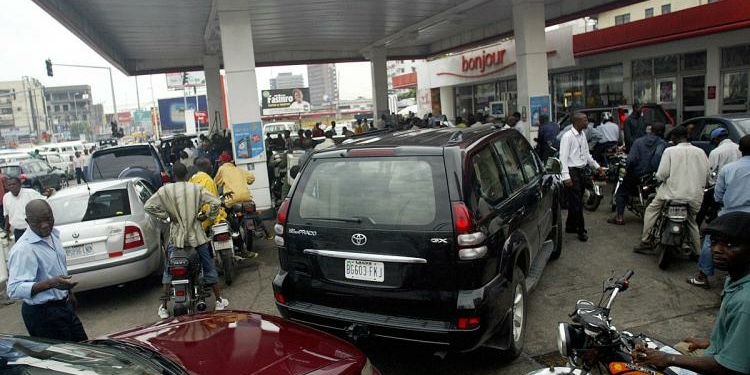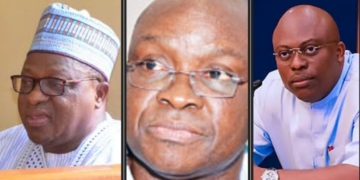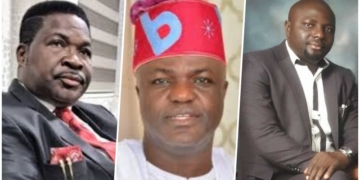On May 29, 2023 President Bola Ahmed Tinubu announced the total removal of subsidy in premium motor spirit, PMS popularly known as petroleum.
The president during his speech shortly after his swearing-in explained that the country can no longer sustain subsidy payment as it was not even captured in the second half of the 2023 budget.
According to the president Bola Tinubu in his inaugural speech, “unfortunately, the budget I have glimpsed before I assume office and what I have heard is that no provision is there for fuel subsidy.
“So, fuel subsidy is gone. We commend the decision of the outgoing administration in phasing out the petrol subsidy regime which has increasingly favored the rich more than the poor.
“The subsidy can no longer justify its ever-increasing costs in the wake of drying resources. We shall instead re-channel the funds into better investment in public infrastructure, education, health care, and jobs that will materially improve the lives of millions.”
However, few minutes after the speech, long queues returned to filling stations in major cities across the country.
Though the President did not specify the amount pump price should be, many filling stations across the country hiked the price from N195 to N600, N650 and N700 as the case may.
The cost of transportation equally increased with more than 200%.
A brief history of fuel importation and its attendant subsidy in Nigeria showed that it was meant to be a temporal measure to provide enough product and cushion the effect on the citizens.
In the early 90s and particularly during the Late Gen. Sani Abacha regime, our fuel refineries were in bad shape, and so couldn’t refine enough petroleum products to sustain the ever increasing demand of the citizens.
It could be recalled that in those days, many motorists in Enugu, Abuja, Lagos, Port Harcourt and other major cities in the country slept in the filling stations to buy fuel.
However, to mitigate this economic hardship, the administration of late Gen. Sani Abacha resorted to importation of Premium Motor Spirit to augment the locally refined one.
In any case, with this measure, long queues in filling stations across the country disappeared.
But, it could be said that unfortunately, instead of using this window of relief to repair our petroleum refineries, they were left to further deteriorate and collapse.
However, during President Goodluck Jonathan administration, subsidy removal became another topical issue in the country.
In January 2012, his administration took a drastic decision and decided to end the subsidy era, but it wasn’t to be.
The decision, planning and implementation of subsidy removal almost consumed President Goodluck Jonathan’s administration.
The backlash, argument, counter argument, hullabaloo and jiggery pokery that followed the “attempted” subsidy removal in 2012 was so much enormous that
many political observers are still wondering if it didn’t contribute towards the defeat of the Peoples Democratic Party, PDP in the 2015 general election.
There was nationwide protest that almost brought the administration to its kneels.
Most of the opponents of the subsidy removal during President Goodluck Jonathan’s administration called the policy fraud and circus show of incompetence.
They based their argument on the fact that the administration was not spending as much it claimed on the subsidy. That it was a fraudulent policy to siphon the nation’s scarce fund.
Today, after much wriggling and dilly-dallying, the Nigerian government under President Bola Ahmed Tinubu, has finally done away with the subsidization of fuel in the country.
Like a proverbial fly that perches in a dangerous position, fuel subsidy has been seen as the central point of attraction in spheres of our economy. No aspect of the economy is insulated from the effects of the high cost of fuel in the country.
Expectedly, the trickling effects of the subsidy removal has gradually started to tell on the already traumatized economy.
In a chat with one of the commercial transporter, Chijioke Ugwuonu, he lamented that the situation has crippled the economy.
According to things are worse off now than before the subsidy removal.
“Before now, when fuel was N230, I will buy 30 litres at N7050 and take my passengers to and fro Enugu and make up to N25,000. But today, 30 litres is N16500 and you will end up making like N14,000 at the maximum, all things being equal.”
Narrating further, Ugwuonu, a commercial bus driver who plies Enugu/Nsukka axis stated that ” another ugly side of the story is that there is no much passengers again. Many people prefer to do waybill to travelling. Added to this again is the fact that with the increase in fuel price, so many motor parts have followed suit.”
There is no gainsaying the fact that Nigeria can ill-afford this level of subsidy payment with its low revenue profile.
The fiscal crisis of the Nigerian economy is endemic and needs a drastic action to stabilize.
The government should consider how its fiscal and monetary policies affect employment, prices, and productivity. may undermine growth and economic recovery.
It may also reduce household consumption and aggravate poverty. This is why some who support the removal of subsidy are worried at the abrupt and reckless manner of the removal.
Even Mr. Peter Obi in his campaign stated that he would remove subsidy should he be elected. But, he never said it would come this abrupt and reckless that has pushed tens of millions of households in Nigeria groping for seemingly elusive alternative.
Is it not difficult to convince an empathetic person that people living on less than N30,000 monthly should buy petrol at N535 per litre?
If they pay the associated costs of the increase in petrol prices, we expect they will have less to expend on consumables that improve their wellbeing and enable them to escape poverty.
So, it is expected that as food inflation rises at the heels of subsidy removal, we expect access to basic nutrition, healthcare, and education to reduce, worsening poverty and inequality.
The federal government is responding by promising an increase in minimum wage. Labour unions will surely bargain for mitigation for workers. But the population of Nigerians in formal employment is negligible.
What happens to the rest of Nigerians in informal sector with no regular jobs or those tapped in the bottom million who cannot externalise the pass-through costs of petrol?
Those are the victims of the Nigerian economy designed to cater to the wellbeing of the rich and political elites. In the short to medium term, none of the conventional mitigations, including the ridiculous N5,000 cash transfer to 40 million poor household, will shield the over 80 milion very poor Nigerian from the crushing impact of drastic spikes in energy price.
The spillover effect of the energy price hike in a country where electricity supply is so much epileptic; where more than 25% of the population live far below poverty line could only be imagined.
The debate on subsidy has remained that it is not bad an idea but the implementation riddled with high level of corruption and fraudulent activities made it look like an economic waste.
According to The Orosanya Report, it recommended rationalization of parastatals and agencies to reduce costs of governance.
However, successive Nigerian leaders have refused to implement the report because it is suicidal and as such will result in powerful elites losing high paying political jobs.
It has been observed that Nigerian legislators earn the highest in the world in a bankrupting economy. The annual salary and benefits of a Nigerian senator come about N350m while those of a minimum wage earner are less than N400,000.
Despite clamor and street protests, legislators have refused to cut down on the gross waste. Few days ago, the government adopted 114% increase on the salaries of Nigerian law makers in an economy that has already been battered with poor and bad policy implementation.
In the same vein, Nigeria loses about 470,00 bpd (amounting to $700m monthly) of its crude to thieves working for top military and political leaders. There is no consensus to go hard on oil bunkering because it is Nigerian military and political leaders who are involved in the criminality. Much as we have accepted this inefficiency in our stride, the majority poor are always at the receiving end.
Nevertheless, as the nation watches subsidy removal effects take its economic toll on the poor citizenry, it is expected that the savings from the subsidy removal, as claimed by the Federal government should be used to mitigate and cushion the excruciating economic impacts it has generated.
They should be used to build modern hospitals, equipped with low cost or totally free drugs. This will go a long way in snatching them away from the deadly clutches of the private hospitals whose stock in trade is exploitation.
Our ill-equipped schools at all levels should also be given a facelift this time around with compulsory free education bill been passed to law.
Infrastructure development should be seen to given more than attention so as to leverage on the biting effects of the subsidy removal.




Discussion about this post